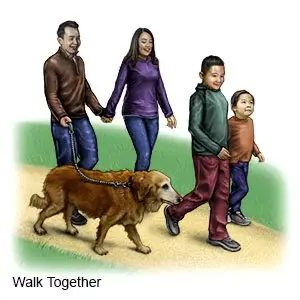What is seasonal affective disorder?
Seasonal affective disorder (SAD) is a type of depression that happens during a change of seasons. SAD usually happens during autumn and winter months when there is less sunlight because the days are shorter. This is called winter-onset depression. Symptoms usually go away in late spring or early summer. Episodes of SAD may be mild or severe.
What causes SAD?
The cause of SAD is not known. Brain chemicals that affect your mood can change according to the amount of light you get each day. You may produce more of a brain chemical that causes sleep and less of a chemical that causes a happy mood. This change in brain chemicals can make you feel depressed or have less energy than usual.
What increases my risk for SAD?
- Female gender
- A family history of SAD
- Depression or bipolar disorder
- Living in an area that does not get much regular sunlight
What other signs or symptoms may I have?
- A change in appetite, or a craving for carbohydrates
- Weight gain or loss without trying
- Less energy than usual, or oversleeping often
- Trouble concentrating or sleeping
- Feeling anxious, irritable, or hopeless
- Headaches or other pain
- Loss of interest in activities you usually enjoy, or not wanting to spend time with others
How is SAD diagnosed?
Your healthcare provider will ask if you feel depressed during certain times of the year. Your provider will ask if symptoms go away when the season changes and if you had the same symptoms the year before. You have to have the same symptoms at least 2 years in a row for your provider to diagnose SAD. Tell your provider if you have depression any other time of the year. This may mean you have a different kind of depression than SAD.
How is SAD treated?
Your healthcare provider may recommend a combination of the following:
- Antidepressants may be given to help improve your mood.
- Therapy is used to help you talk about any negative feelings or depression you are feeling. You may also be able to learn how to prevent or manage SAD by talking about what worked in past years.
- Light therapy may include sitting in front of a light box or wearing a light visor for a certain amount of time each day. A light timer in your bedroom can turn lights up slowly. This may help you wake up more naturally than when you use an alarm clock. Do not use a tanning bed instead of a light box or visor. Tanning beds can cause serious skin damage.
Treatment options
The following list of medications are in some way related to or used in the treatment of this condition.
- Wellbutrin XL
- bupropion
What can I do to prevent or manage SAD?
- Exercise as directed. Exercise can help improve depression and make you feel less anxious.

- Eat a variety of healthy foods. Healthy foods include fruits, vegetables, lean meats, fish, whole-grain foods, and low-fat dairy products. Limit sugar and foods that contain simple carbohydrates, such as cookies and cake.

- Create a sleep routine. Go to bed at the same time each night, and get up at the same time each day.
- Increase your exposure to light. Turn on lamps in your home. Go outside several times during the day. Even on cloudy days, you will be in helpful sunlight. If possible, visit areas that get more light than where you live.
- Manage stress. Stress can increase depression and make it harder to sleep.
- Do not drink alcohol or use illegal drugs. Alcohol and drugs can make depression worse. Ask your healthcare provider for more information if you need help quitting.
Call 911 if:
- You have thoughts of harming or killing yourself.
When should I contact my healthcare provider?
- You have new or worsening symptoms, even after treatment.
- You have questions or concerns about your condition or care.
Care Agreement
You have the right to help plan your care. Learn about your health condition and how it may be treated. Discuss treatment options with your healthcare providers to decide what care you want to receive. You always have the right to refuse treatment. The above information is an educational aid only. It is not intended as medical advice for individual conditions or treatments. Talk to your doctor, nurse or pharmacist before following any medical regimen to see if it is safe and effective for you.© Copyright Merative 2023 Information is for End User's use only and may not be sold, redistributed or otherwise used for commercial purposes.




